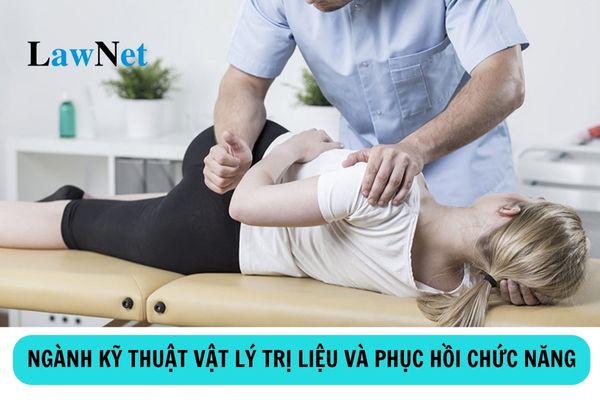Vietnam: What jobs can graduates of college-level physical therapy and rehabilitation engineering do?
What jobs can graduates of college-level physical therapy and rehabilitation engineering in Vietnam do?
Under sub-section 5 Section A Part 2 of the Regulations on minimum knowledge and competency requirements for graduates at intermediate and college levels in the fields of health and social service (hereinafter referred to as the Regulations) issued together with Circular 54/2018/TT-BLDTBXH, graduates of college-level physical therapy and rehabilitation engineering in Vietnam may do the following jobs:
- Physical therapy rehabilitation;
- Occupational therapy rehabilitation.

What jobs can graduates of college-level physical therapy and rehabilitation engineering in Vietnam do? (Image from the Internet)
What is the general information on college-level physical therapy and rehabilitation engineering in Vietnam?
Under sub-section 1 Section A Part 2 of the Regulations issued together with Circular 54/2018/TT-BLDTBXH, the college-level physical therapy and rehabilitation engineering is described as follows:
Physical therapy and rehabilitation engineering is a specialized medical field involving modern medical techniques, applying physical methods and non-pharmacological approaches in the treatment of patients, meeting level 5 requirements in the Vietnam National Qualification Framework.
The basic techniques used in rehabilitation include exercise therapy, occupational therapy, electrotherapy, thermotherapy, light therapy, massage therapy, traction therapy, etc. Currently, physical therapy-rehabilitation techniques are very popular and are chosen to treat patients for functional rehabilitation.
The Physical therapy and rehabilitation engineering field has two main areas of work: physical rehabilitation, and occupational therapy rehabilitation.
Graduates of physical therapy and rehabilitation engineering can work in hospitals, convalescent centers – rehabilitation centers; orthopedic centers – rehabilitation centers, clinics, and state and private medical facilities.
Minimum knowledge volume: 2,500 hours (equivalent to 90 credits).
What are the minimum requirements for skills of graduates of college-level physical therapy and rehabilitation engineering in Vietnam?
Under sub-section 3 Section A Part 2 of the Regulations issued together with Circular 54/2018/TT-BLDTBXH, graduates of college-level physical therapy and rehabilitation engineering should possess the following skills:
- Effectively communicating with patients, their families, and colleagues;
- Being proficient in initial emergency care;
- Identifying anatomical positions of muscles - bones - and nerves in patients;
- Proficiently assessing the functions of the body's motor system;
- Safely and proficiently operating and maintaining specialized rehabilitation equipment;
- Proficiently performing physical exercise therapy techniques, physical therapy treatments, cardiovascular-respiratory system physical therapy, neurological-muscle system physical therapy, and orthopedic physical therapy;
- Applying acupuncture and non-pharmacological (traditional medicine) methods for patient rehabilitation;
- Instructing patients and their families in the proficient use of simple assistive devices in treatment;
- Proficiently guiding community-based rehabilitation methods;
- Developing work plans in teams and cooperating with team members to implement patient care plans;
- Organizing and managing physical therapy and rehabilitation departments scientifically;
- Basically using informatics skills as per regulations; applying IT in certain specialized tasks of the field;
- Basically using foreign language, achieving level 1/6 in Vietnam’s foreign language competency framework; and applying foreign languages in certain specialized tasks of the field.
What are the minimum requirements for knowledge of graduates of college-level physical therapy and rehabilitation engineering in Vietnam?
Under sub-section 2 Section A Part 2 of the Regulations issued together with Circular 54/2018/TT-BLDTBXH, graduates of college-level physical therapy and rehabilitation engineering should possess the following knowledge:
- Explaining basic knowledge of human anatomy and physiology, pathophysiology, genetic biology, pathology, pharmacology, and initial emergency care in formulating treatment plans;
- Describing acupuncture and non-pharmacological (traditional medicine) methods for patient rehabilitation;
- Explaining the causes and symptoms in treating cardiovascular-respiratory system physical therapy, neuro-musculoskeletal system physical therapy, orthopedic physical therapy, and community-based rehabilitation;
- Describing exercise therapy methods, function assessment procedures of the motor system, and maintenance procedures of physical therapy equipment in treatment;
- Analyzing therapeutic effects in cases of cardiovascular-respiratory system physical therapy, neuro-musculoskeletal system physical therapy, orthopedic physical therapy, and community-based rehabilitation;
- Describing basic knowledge of politics, culture, society, law, national defense and security, physical education according to regulations.

